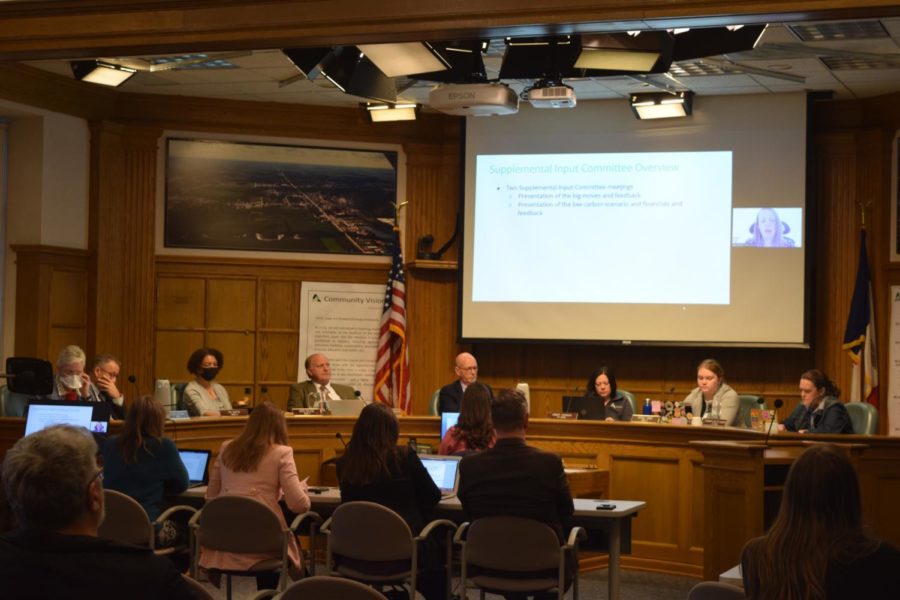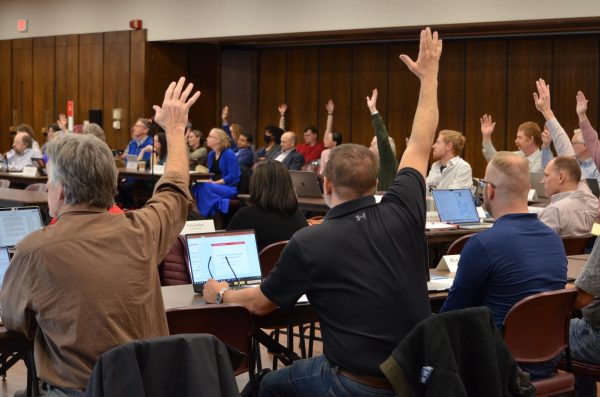Climate Action Plan draft on the horizon
The Ames City Council, in the fourth Steering Committee meeting, discussed the components of the Ames Climate Action Plan.
Ames Assistant City Manager Deb Schildroth said a draft of the Climate Action Plan and the implementation strategy could be available to the public and the council on April 18.
The Ames City Council will not be able to meet its original goals for the Climate Action Plan, as previously reported by the Daily. Schildroth, the leader of the plan, was able to provide a revised timeline for the action plan.
“We are earmarking having a final Climate Action Plan to council for approval either in May or June,” Schildroth said.
Mack Shelley, a university professor in the political science department, said the feasibility of the city’s plan is high and time is of the essence.
“If you don’t do it freaky fast, the problem is not gonna get any better, and the longer you wait to actually implement action, the more it’s going to cost later,” Shelley said. “More damage will have been done in the meantime that somebody has to clean up– either metaphorically or literally.”
Although the plan has a steep price tag of $2.4 billion, Shelley said the city has the tools to soften the impact for lower-income households through potential vouchers.
Brian Morris has been an Ames resident for two years. He said despite not being well-versed about the Climate Action Plan, his family has already begun making changes to their household.
“We got the solar thing going, and we bought into that; my wife and I did,” Morris said. “Other than that, I guess I’m uninformed.”
Morris said since implementing solar power, his family has seen a decrease in household expenses.
“Yeah, costs may go up, but it’s hard to get change and improvement without some costs, and we’re willing and able to pay those costs,” Morris said. “We’re very frugal and sensible, and so we have gotten ourselves in a position where if it costs us a little more to use energy from a clean source, we’re okay with it.”
According to city documents, a majority of the listed action steps state that they will disproportionately impact lower-income households due to the cost increases needed to fulfill the plan.
Jackalyn Sorensen, a junior double majoring in international studies and journalism, said it is not surprising that the city will not be able to achieve its original goal.
“It’s disappointing, but not surprising,” Sorensen said. “I feel like everywhere they’ve been making overly-optimistic goals on transferring over from non-renewable energy to renewables.”
Julie Orning, an Ames resident of 74 years, shared sentiments similar to Morris.
“I’m very fearful that if we don’t do something now, that we may not be able to ward off any of the other stuff that’s going on right now all over the world,” Orning said. “I’m fearsome that nothing’s going to really get done or accomplished no matter how many people talk about it.”
For Ames to become more sustainable according to the action plan, the city is looking toward introducing energy sources such as wind and solar into the community, Schildroth said. However, Shelley said a not-in-my-backyard mindset from policymakers and community members slows progress.
“The point is that people want to avoid having to assume responsibility, like having something physically on their property, paying taxes for it or changing the way that they operate,” Shelley said.
Shelley added that short-sightedness on the issue of climate change also stunts the city’s progress.
“We’re definitely dealing with longer-term issues,” Shelley said. “That simple fact makes it harder for a lot of people to process that we kind of have to be in this for the long run–for the long haul.”
Schildroth said with Ames being the home of Iowa State University, the city already has an environmentally conscious community, but a key factor in getting the plan rolled out is educating the larger community on aspects other than climate change, such as low-income households that may need to know information about the Inflation Reduction Act to aid in paying for aspects of the plan.
“What is a retrofit?” Schildroth asked. “Where are places that I could go to buy a heat pump, or who installs it? Who are the contractors available that can do that kind of thing? So we know in all of these moves, there’s education and information that has to go along with it.”
Schildroth said that overall, action is better than inaction.
“I really think making progress towards our target is better than not doing anything at all because there’s a cost to not doing anything at all,” Schildroth said.
Sorensen said she would like to see an initiative to focus on better plastic recycling methods on campus.
“There’s lots of students that use single-use plastic and don’t really know what to do with it other than throw it away because the recycling here is not very good,” Sorenen said. “I think we just need a better way to deal with food waste as well.”
Your donation will support the student journalists of the Iowa State Daily. Your contribution will allow us to purchase equipment, send our student journalists to conferences and off-set their cost of living so they can continue to do best-in-the-nation work at the Iowa State Daily.













